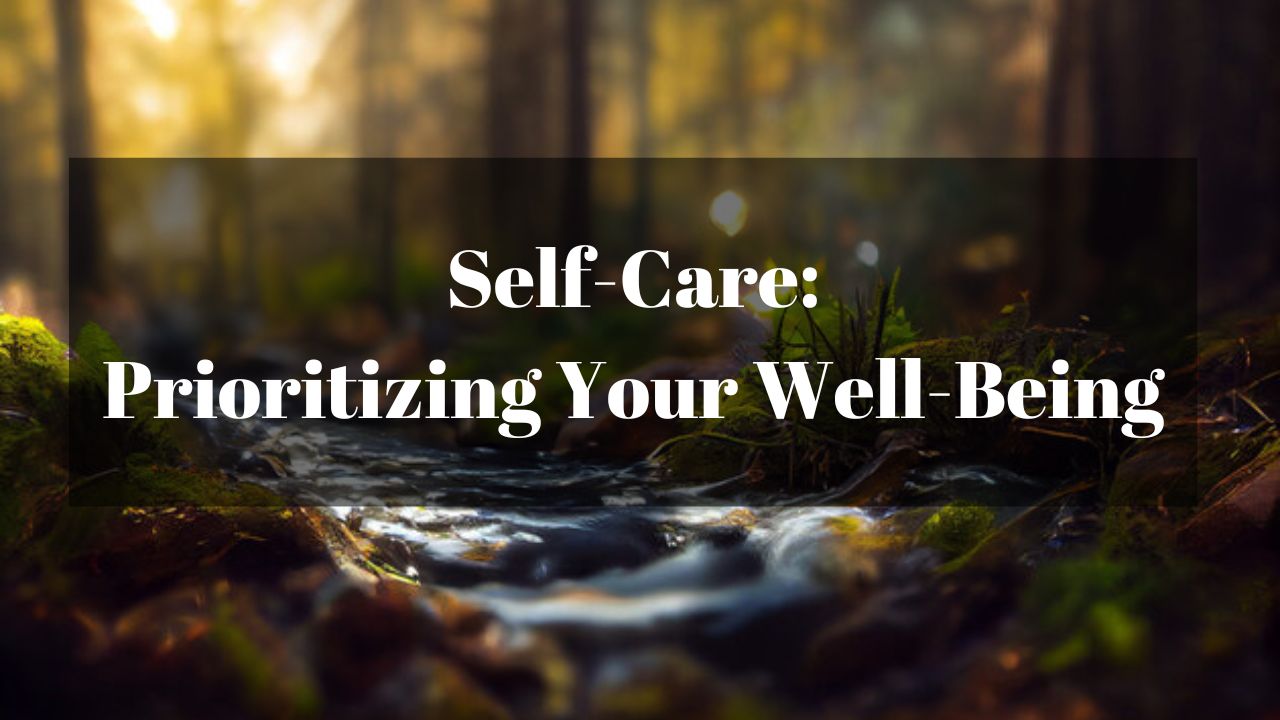Self-Care: Prioritizing Your Well-Being
In the fast-paced whirlwind of modern life, prioritizing self-care has become more crucial than ever. Amid the demands of work, relationships, and daily responsibilities, dedicating time and energy to your well-being is not only a luxury but a necessity. In this article, we’ll delve into the importance of self-care, explore various dimensions of well-being, and provide practical tips to help you cultivate a lifestyle that nurtures both your physical and mental health.
Understanding Self-Care
-
Definition of Self-Care:
Self-care is a holistic practice that involves intentional actions and choices to promote overall well-being. It extends beyond pampering activities and encompasses the physical, emotional, mental, and spiritual aspects of one’s life.
-
Importance of Self-Care:
Prioritizing self-care is essential for maintaining a healthy balance in life. It not only rejuvenates your body and mind but also enhances resilience, reduces stress, and improves overall quality of life. By investing in self-care, you empower yourself to navigate life’s challenges with grace and vitality.
Physical Well-Being
-
Adequate Sleep:
Quality sleep is fundamental to physical and mental health. Establish a consistent sleep routine, create a comfortable sleep environment, and aim for 7-9 hours of restorative sleep each night to support optimal functioning.
-
Regular Exercise:
Incorporate regular physical activity into your routine. Whether it’s brisk walking, yoga, weightlifting, or dancing, find activities that you enjoy. Exercise not only improves physical health but also releases endorphins, promoting a positive mood.
-
Nutritious Eating Habits:
Fuel your body with a balanced and nutritious diet. Prioritize whole foods, fruits, vegetables, lean proteins, and stay hydrated. Pay attention to portion sizes and practice mindful eating to cultivate a healthy relationship with food.
Emotional Well-Being
-
Practice Gratitude:
Cultivate gratitude as a daily practice. Take time to reflect on the positive aspects of your life, expressing appreciation for both big and small moments. Gratitude can shift your focus from challenges to the abundance present in your life.
-
Emotional Expression:
Create a healthy outlet for emotional expression. Whether through journaling, art, music, or conversations with loved ones, acknowledging and expressing your emotions fosters emotional well-being and resilience.
- Set Boundaries:
Establish clear boundaries in your personal and professional life. Learn to say no when necessary, and prioritize activities and relationships that contribute positively to your well-being. Boundaries protect your energy and maintain a healthy balance.
Mental Well-Being
- Mindfulness and Meditation:
Incorporate mindfulness practices into your daily routine. Mindful breathing, meditation, or guided imagery can help calm the mind, reduce stress, and enhance focus. Even a few minutes of daily mindfulness can yield significant benefits.
- Disconnect from Technology:
Create intentional breaks from digital devices. Limit screen time, especially before bedtime, and set boundaries on social media use. Disconnecting from technology promotes mental clarity and reduces feelings of overwhelm.
- Lifelong Learning:
Engage in activities that stimulate your mind and foster intellectual curiosity. Whether it’s reading, taking up a new hobby, or pursuing further education, continuous learning contributes to mental well-being and personal growth.
Spiritual Well-Being
- Connect with Nature:
Spend time in nature to nurture your spiritual well-being. Whether it’s a walk in the park, hiking, or simply enjoying the outdoors, nature provides a sense of connection, peace, and perspective.
- Cultivate Meaningful Connections:
Nurture meaningful connections with others. Whether through family, friends, or community involvement, fostering social bonds contributes to a sense of belonging and spiritual fulfillment.
- Reflect and Set Intentions:
Take moments for self-reflection. Consider your values, purpose, and goals. Setting intentions aligns your actions with your deeper sense of self, fostering spiritual well-being.
Practical Tips for Incorporating Self-Care
- Create a Self-Care Routine:
Establish a regular self-care routine that includes activities for each dimension of well-being. Consistency is key to reaping the long-term benefits of self-care.
- Schedule “Me Time”:
Block off dedicated time for self-care in your schedule. Treat this time with the same importance as any other commitment, and guard it as sacred.
- Prioritize Self-Care Activities:
Identify self-care activities that resonate with you and prioritize them. Whether it’s a bubble bath, a walk in the park, or meditation, make time for what brings you joy and relaxation.
- Seek Professional Support:
If needed, don’t hesitate to seek support from professionals. Whether it’s therapy, counseling, or coaching, professionals can provide guidance and tools to enhance your well-being.
Conclusion:
Prioritizing self-care is a transformative journey that embraces the multidimensional aspects of well-being. By cultivating habits that nurture your physical, emotional, mental, and spiritual health, you invest in a resilient and fulfilling life. Remember that self-care is not selfish; it is a fundamental act of self-love that empowers you to show up fully in your personal and professional life. As you embark on this journey, may you find harmony and balance, embracing the beauty of a life well-cared for.
Thanks for visiting Respect Lifestyle











